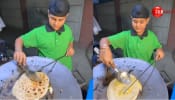New York: Capuchin monkeys judge the social interactions of others and hold biases against individuals behaving selfishly, new research has found.
Researchers investigated how capuchin monkeys in captivity reacted to different third-party social interactions.
In one study, capuchins watched two actors engage in reciprocity exchanges, in which one actor handed over several balls to another, who then either reciprocated or selfishly kept all the balls.
The second study involved a similar setup, but this time one actor helped or refused to help another actor who was struggling to open a container.
After each scene, the monkeys chose a treat from one of the actors they consistently avoided treats from actors who refused to reciprocate or help.
Capuchins in the wild may keep tabs on group members to figure out whom to avoid interacting with on a specific day, researchers said.
James Anderson, a primatologist at the University of Stirling in Scotland and lead author of the new studies tested capuchins` reactions to scenes of reciprocity.
Two actors began with two containers each, one of which contained three balls. One actor held out an empty container to the second actor, who then placed her balls into the container.
Next, the second actor similarly requested balls from the first actor. In half of the trials, the first actor refused to reciprocate and kept all six balls to herself.
The primates showed no preference when both actors reciprocated, but they consistently avoided taking treats from non-reciprocators, the researchers found in the study, detailed in the journal Cognition.
In a companion study, published in the journal Nature Communications, the researchers tested how capuchins regard unhelpful people.
Here, one actor struggled to open a container and requested help from the second actor, who either helped or turned away. Similar to before, the capuchins avoided accepting treats from unhelpful actors.
The researchers then investigated what happens when both actors have a container. Again, if the second actor refused to help, the monkeys showed a sharp bias against her and accepted treats only from the other actor.
However, if the actor didn`t help because she was too occupied with her own container, the capuchins showed no biases, further suggesting the monkeys considered the actors` intentions.
Importantly, the objects handled in both studies had no relevance to the monkeys, Anderson said. If actors handled food, the monkeys would likely choose whoever they thought would give them the most treats.
PTI















